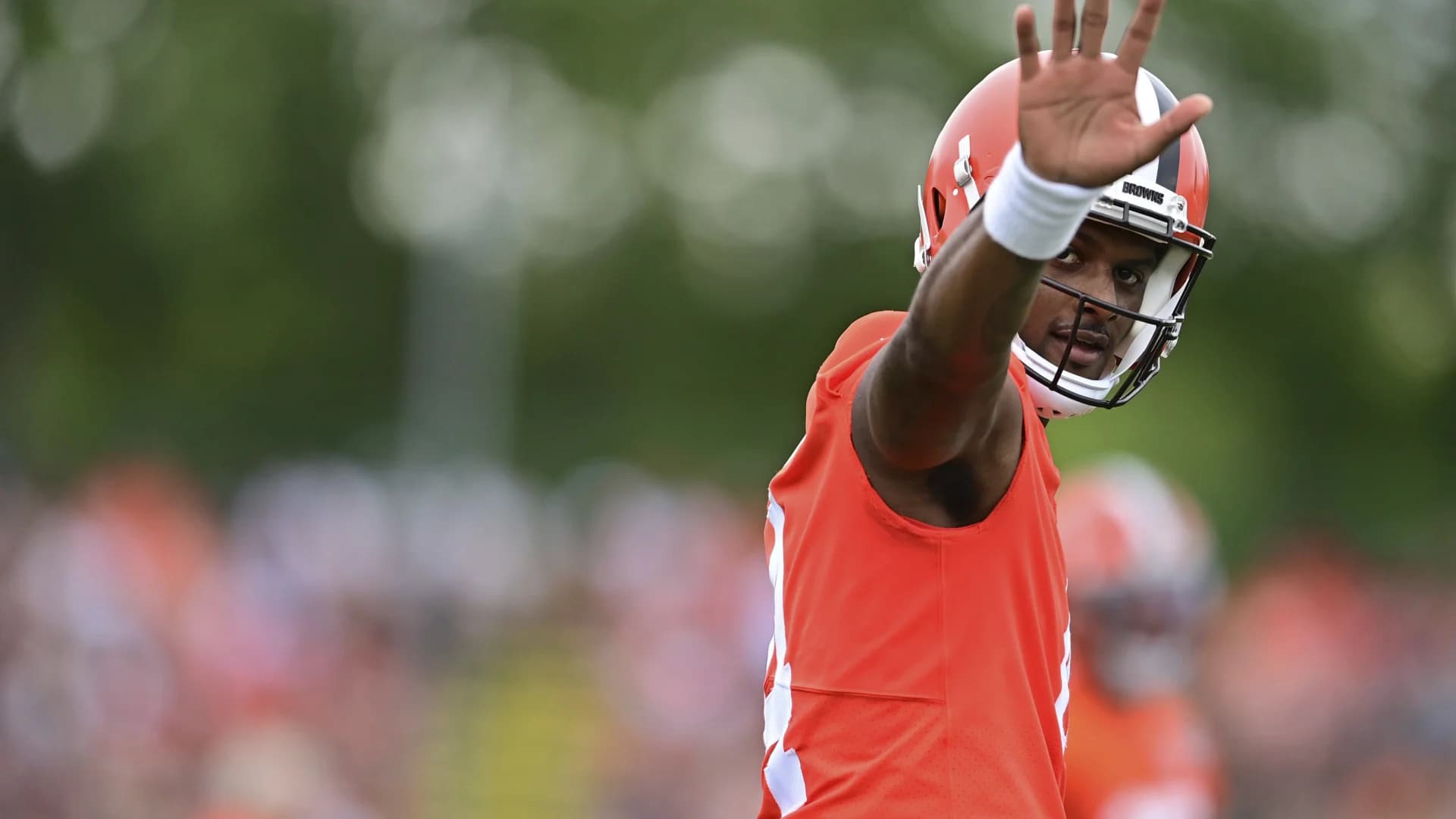More Stories

Deshaun Watson has reached a settlement with the NFL and will serve an 11-game suspension and pay a $5 million fine rather than risk missing his first season as quarterback of the Cleveland Browns following accusations of sexual misconduct.
Watson was accused of sexual assault and harassment by two dozen women while he played for the Houston Texans. The league had sought to ban him for at least one year for violating its personal conduct policy.
“I’m grateful that the disciplinary process has ended and extremely appreciative of the tremendous support I have received throughout my short time with the Browns organization. I apologize once again for any pain this situation has caused. I take accountability for the decisions I made," Watson said in a statement released through the team. “My focus going forward is on working to become the best version of myself on and off the field and supporting my teammates however possible while I’m away from the team.”
The settlement ends months of posturing between Watson’s legal team, the NFL and NFL Players Association.
As part of the settlement, Watson may return for the Browns’ game on Dec. 4 in Houston.
On Aug. 1, the three-time Pro Bowler was suspended six games by Sue L. Robinson, a former federal judge jointly appointed by the league and union to act as an independent disciplinary officer.
Robinson found the 26-year-old Watson violated the league’s personal conduct policy after reviewing an investigation into his actions and called his behavior “egregious” and “predatory.”
Believing the suspension was too light, the league appealed and pushed Watson’s case back to Goodell, who had handled all player discipline in the past. The league previously pushed for an indefinite suspension and hefty fine.
Goodell appointed former New Jersey Attorney General Peter C. Harvey to hear the appeal. Harvey is an attorney who was previously involved in the NFL’s decision to suspend Cowboys running back Ezekiel Elliott for six games during the 2017 season for domestic violence allegations.
Per the 2020 collective bargaining agreement, Harvey’s decision would have constituted “full, final and complete disposition of the dispute.”
At the owners’ meetings this month, Goodell said the league’s pursuit of a yearlong ban was warranted following its investigation and Robinson’s findings.
“She reinforced the evidence,” Goodell said. “There were multiple violations that were egregious, and it was predatory behavior.”
In her conclusion, Robinson cited Watson’s lack of remorse as a factor in her decision. Watson apologized for the first time “to all the women that I have impacted” before making his Browns’ debut in an exhibition in Jacksonville.
Watson was accused of being sexually inappropriate with the women during massage therapy sessions from March 2020 to March 2021 in Texas. In civil lawsuits filed in Texas, the women accused Watson of exposing himself, touching them with his penis or kissing them against their will. One woman alleged Watson forced her to perform oral sex.
Two separate grand juries in Texas declined to indict Watson, who has denied any wrongdoing. He recently settled 23 of 24 lawsuits.
For now, the suspension ends months of speculation about whether Watson would play in 2022 for the Browns, who outbid several other teams, traded three first-round draft picks to the Texans in March and signed the QB to a five-year, $230 million contract.
Watson’s case sparked strong opinions while raising questions about the league’s handling of player discipline and its spotty record of supporting women.
The Browns believe Watson could make them a Super Bowl contender. Without him, they could struggle to simply contend in the AFC North against defending conference champion Cincinnati along with Baltimore and Pittsburgh.
The suspension also means Watson will be idle longer. One of pro football’s elite QBs, he sat out last season in Houston after demanding a trade and before the sexual allegations surfaced.
In her 16-page ruling, Robinson found that the league proved its case that Watson violated three provisions of the conduct policy: sexual assault as defined by the league, posing a genuine danger to the safety and well-being of another and undermining or putting the league’s integrity at risk.
Robinson also pointed out flaws in the league’s conduct policy, saying it was unfair to “identify conduct as prohibited only after the conduct has been committed, just as it is inherently unjust to change the penalties for such conduct after the fact.”
Her punishment was criticized by several organizations, including The National Organization for Women, which called it “unacceptable, insulting and dangerous — but not surprising. The NFL and the multibillion-dollar sports industry have a vested interest in enabling sexual misconduct, assault and violence.”
Attorney Tony Buzbee, who represents all 24 women who sued Watson, and Ashley Solis, the first woman to go public with allegations against Watson, decried the original six-game suspension at a news conference in Houston in early August.
Watson has continued to practice while his case made its way through the league’s process.
All along, the Browns’ plan was to turn their offense over to veteran Jacoby Brissett, who has made 37 career starts, during Watson’s suspension. But it’s now possible Cleveland will explore other options at quarterback.
More from News 12
2:12

STORM WATCH: Snow showers overnight followed by frigid air in the Hudson Valley
2:36

Violent arrest in Peekskill prompts ‘Justice for Damar’ rally
0:38

Pawling man faces murder charge in death of man found in Putnam County reservoir
0:32

Body found inside car in Spring Valley
1:59

Holiday Fest in Mount Kisco boosts spirits – and local businesses
1:44
